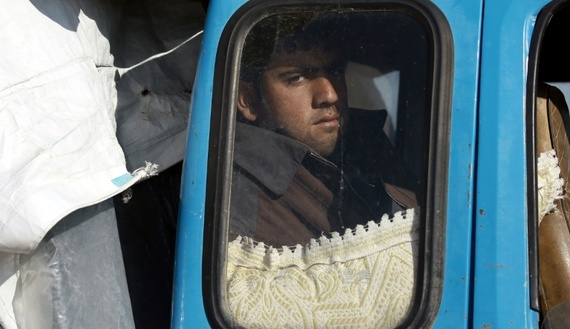Manbij – At a checkpoint for Kurdish and Arab forces in northern Syria, a weary elderly woman and her husband sit in a truck, surrounded by their belongings, waiting for safe passage away from the ISIS group.
They are among thousands of civilians waiting long hours at checkpoints as they flee a Syrian regime offensive against ISIS in the east of Aleppo province.
The civilians are headed towards the town of Manbij, and surrounding areas, seeking safety in territory held by a US-backed Kurdish-Arab alliance called the Syrian Democratic Forces (SDF).
The influx of civilians has put pressure on the SDF, with large crowds building up at its checkpoints, waiting for security checks intended to weed out escaping ISIS.
“Since we arrived, they’ve checked us three times, and examined our identity cards and family documents,” says Nuri Hassan Abdullah, who fled with his wife from the village of Maskana.
“But I lost my wife’s identity card during the large number of checks while we were at the checkpoint, and now I don’t know what to do, and how to continue on our way.”
Abdullah said he and his wife had fled their village a week ago, as it came under heavy air strikes.
“I need to cross so I can take my wife to Damascus to treat her foot, all I care about is crossing,” he said. The woman broke her foot several weeks ago.
“I have suffered a lot, and I hope I will heal,” she said, interrupting him.
More than 65,000 people have fled twin offensives against ISIS in northern Syria in recent days, 26,000 of them fleeing the Russian-backed regime assault.
Regime forces are seeking to expel ISIS militants from the town of Khafsah and the nearby pumping station that provides the water supply to Aleppo. Residents of Syria’s second city have been without mains water for some 50 days after ISIS cut the supply.
Since the assault began in mid-January, the regime has taken more than 110 villages and towns from the jihadists, advancing behind heavy air and artillery bombardment.
The civilians reach the checkpoints on foot and in cars, trucks and small buses, sometimes waiting hours or even days before being allowed into Manbij, said an AFP reporter.
Some stay in the town or surrounding villages, while others seek safe passage elsewhere.
At another checkpoint, manned by local police near the village of Saediya, civilians are gathered in a square for security checks.
In one car, stuffed with belongings, is 29-year-old Abdel Latif al-Khalaf, his hand covered in a bandage.
“ISIS fighters opened fire on us while we were fleeing four days ago towards Khafsah,” he told AFP.
“I made it to a hospital with five others who were also injured and we received treatment and then passed through several checkpoints before we got here,” he said.
He was fleeing with his mother and others from their village of Salma, near Khafsah.
A man, shot in the foot, sits in the back of the car.
Mohamed Ahmed al-Saadoun, a police officer manning the Saediya checkpoint, said the long queues were the result of procedures to prevent jihadist infiltration.
He said arriving men were checked not only for weapons and explosives, but also more subtle signs on their bodies indicating ISIS activity. Security forces looked for “marks from wearing military uniforms or explosives belts, or welts on fingers from repeated pressure on a trigger, or bruises or fresh wounds from gunshots or shrapnel,” he said.
In Manbij, police spokesman Mahmud Uthman Khalaf said security forces had detained at least 20 suspected ISIS infiltrators among arriving displaced civilians.
“We will not allow anyone to tamper with the security of our city, we will never accept that,” he told AFP.
